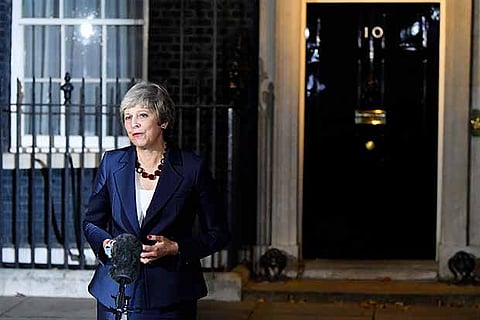

London
British Prime Minister Theresa May on Wednesday said she had won over her divided Cabinet after hours of talks to back the withdrawal agreement struck with the European Union (EU).
She said that her team had a "long, detailed and impassioned debate", at the end of which they agreed to move ahead with the deal on the table.
"I firmly believe with my head and my heart that this is in the best interests of our entire United Kingdom,” she said in her statement.
There had been much speculation over the major Cabinet showdown, with many of its members opposed to large chunks of the draft agreement. Some media reports suggest that she may not be in the all-clear just yet, with a potential no-confidence motion in her leadership likely to be mounted by her Conservative Party MPs unhappy with the deal.
Earlier, addressing a raucous House of Commons during her weekly Prime Ministers' Questions (PMQs) ahead of the crunch meeting at Downing Street, the British PM told MPs that the deal agreed with the EU delivers on the British public's vote in favour of Brexit in the 2016 referendum.
"What we have been negotiating is a deal that does deliver on the vote of the British people," she said, adding that the agreement would give the UK control of borders, laws and money and also protect business and jobs.
However, Opposition Labour Party leader Jeremy Corbyn accused her of preparing to bring a "false choice" before Parliament between a "botched deal and no deal". He said the UK would be stuck in an "indefinite half-way house without any real say" if the current Brexit agreement went ahead.
But May countered that the Labour Party's objective was to "frustrate Brexit and betray the vote of the British people".
Downing Street had said that the UK and EU have agreed an initial draft agreement on the negotiating terms for Britain's exit, the so-called divorce settlement, from the economic bloc by March next year. Theresa May was then faced with the tough task of convincing her deeply divided Cabinet that the agreement is the best possible outcome for Britain.
"Both sides want to reach an agreement. But what we are negotiating is immensely difficult. I do not shy away from that," May had said in a speech earlier this week, hours before it emerged that Brussels was ready to publish a 500-page document of the withdrawal agreement once the British PM is able to get her Cabinet on board.
On one of the most contentious aspects of the negotiations, the EU has reportedly dropped its demand for Northern Ireland to remain in the economic bloc's Customs Union as a "back stop" until a future trade deal is signed. However, Theresa May is believed to have agreed that the region can remain more closely aligned to EU regulations in some areas than the rest of the UK.
The deal will involve a two-year transition until 2021, followed by a UK-wide Customs Union "backstop" in the event that the Irish border issue cannot be resolved during that period.
While the full details of the agreement are yet to be published, leading Brexiteers and even some pro-Remain MPs of the ruling Conservative Party have called on ministers to reject the deal as unacceptable.
Northern Ireland's Democratic Unionist Party (DUP), on whom Theresa May relies for her majority in the House of Commons, have warned that the agreement could lead to the break-up of the United Kingdom.
An embattled Theresa May hosted one-on-one briefings with her ministers overnight in Downing Street on Tuesday ahead of the full Cabinet meeting later on Wednesday.
Some key pro-Brexit ministers, including international development secretary Penny Mordaunt and work and pensions secretary Esther McVey, were named as possible members of her Cabinet who might resign in protest and possibly even pave the way for a leadership challenge against the PM.
But Theresa May is thought to have won the support of five key ministers – foreign secretary Jeremy Hunt, home secretary Sajid Javid, Brexit secretary Dominic Raab, environment secretary Michael Gove, and Attorney General Geoffrey Cox.
Once the Cabinet signs off on the deal, the European Commission is expected to publish the details of agreement alongside a much shorter declaration on future economic and security relations, which still need to be fully thrashed out.
Ambassadors from the remaining 27 EU member states will then discuss the possibility of organising an emergency summit later this month, earmarked for November 25, to sign off on it.
However, then the UK government faces a battle to win Parliament's backing on the divorce agreement, with some Tories already vowing to vote against it and the DUP's support being uncertain.
The crucial leg of the Brexit negotiations follows months of wrangles, with transport minister Jo Johnson, his brother foreign secretary Boris Johnson and Brexit secretary David Davis stepping down over the issue.
These ministers have vehemently opposed the withdrawal agreement and called on fellow Tory MPs to oppose it.
This critical stage of negotiations will determine the final stages of Britain's formal exit from the EU on March 29, 2019, after the June 2016 referendum in favour of Brexit.
Visit news.dtnext.in to explore our interactive epaper!
Download the DT Next app for more exciting features!
Click here for iOS
Click here for Android